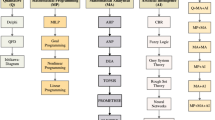Abstract
Many situations involve uncertainty, which we can handle with the help of triangular fuzzy numbers (TFNs). Many scenarios arise in which players in a matrix game cannot reliably estimate their payoffs using crisp numbers, as in real-world scenarios. In these circumstances, TFNs are helpful in game theory. Solving a zero-sum two-player game when all the decision variables and parameters are fuzzy is a worldwide topic of interest to scholars. This article presents a novel solution methodology to solve the zero-sum two-person fully fuzzy matrix game. The payoff matrix, decision variables, and strategies are all taken as TFNs. Two subsidiaries’ fully fuzzy linear programming problem (FFLPP) models for both players have been developed to achieve the objective. These two FFLPP models are converted into crisp linear programming problems (LPPs). This procedure uses a ranking approach to the objective function and introduces fuzzy surplus and fuzzy slack variables in constraints. These crisp LPPs are then solved using TORA software (2.0 version) to get optimal strategies and results. The proposed solution methodology in the paper is followed by a real-world example, ‘Plastic Ban Problem’, and two other examples to prove its applicability and validity.


Similar content being viewed by others
Data Availability
Data sharing not applicable to this article as no datasets were generated or analyzed during the current study.
References
Akram, M., Ullah, I., Allahviranloo, T., Edalatpanah, S.A.: Fully pythagorean fuzzy linear programming problems with equality constraints. Comput. Appl. Math. 40(4), 1–30 (2021)
Ammar, E.S., Brikaa, M.G.: On solution of constraint matrix games under rough interval approach. Granul. Comput. 4(3), 601–614 (2019)
Ammar, E.S., Brikaa, M.G., Abdel-Rehim, E.: A study on two-person zero-sum rough interval continuous differential games. Opsearch 56(3), 689–716 (2019)
Atanassov, K.T.: Intuitionistic fuzzy sets. Fuzzy Sets Syst. 20(1), 87–96 (1986)
Atanassov, K.T.: On Intuitionistic Fuzzy Sets Theory, vol. 283. Springer, Berlin (2012)
Aumann, R.J., Peleg, B.: Von neumann–Morgenstern solutions to cooperative games without side payments. Bull. Am. Math. Soc. 66(3), 173–179 (1960)
Bector, C.R., Chandra, S.: Fuzzy Mathematical Programming and Fuzzy Matrix Games, vol. 169. Springer, Berlin (2005)
Bector, C.R., Chandra, S., Vidyottama, V.: Duality in linear programming with fuzzy parameters and matrix games with fuzzy pay-offs. Fuzzy Sets Syst. 146(2), 253–269 (2004)
Bellman, R.E., Zadeh, L.A.: Decision-making in a fuzzy environment. Manag. Sci. 17(4), B-141 (1970)
Bhaumik, A., Roy, S.K., Weber, G.W.: Hesitant interval-valued intuitionistic fuzzy-linguistic term set approach in Prisoners dilemma game theory using TOPSIS: a case study on human-trafficking. CEJOR 28(2), 797–816 (2020)
Brikaa, M.G., Zheng, Z., Ammar, E.S.: Fuzzy multi-objective programming approach for constrained matrix games with payoffs of fuzzy rough numbers. Symmetry 11(5), 702 (2019)
Brikaa, M.G., Zheng, Z., Ammar, E.S.: Resolving indeterminacy approach to solve multi-criteria zero-sum matrix games with intuitionistic fuzzy goals. Mathematics 8(3), 305 (2020)
Brikaa, M.G., Zheng, Z., Ammar, E.S.: Rough set approach to non-cooperative continuous differential games. Granul. Comput. 6(1), 149–162 (2021)
Brikaa, M.G., Zheng, Z., Ammar, E.S.: Mehar approach for solving matrix games with triangular dual hesitant fuzzy payoffs. Granul. Comput. 7, 731–750 (2022)
Buckley, J.J., Feuring, T.: Evolutionary algorithm solution to fuzzy problems: fuzzy linear programming. Fuzzy Sets Syst. 109(1), 35–53 (2000)
Campos, L.: Fuzzy linear programming models to solve fuzzy matrix games. Fuzzy Sets Syst. 32(3), 275–289 (1989)
Cevikel, A.C., Ahlatioglu, M.: Solutions for fuzzy matrix games. Comput. Math. Appl. 60(3), 399–410 (2010)
Das, S.K., Chakraborty, A.: A new approach to evaluate linear programming problem in pentagonal neutrosophic environment. Complex Intell. Syst. 7(1), 101–110 (2021)
Das, S.K., Mandal, T., Behera, D.: A new approach for solving fully fuzzy linear programming problem. Int. J. Math. Oper. Res. 15(3), 296–309 (2019)
Das, S.K., Edalatpanah, S.A., Mandal, T.: Application of linear fractional programming problem with fuzzy nature in industry sector. Filomat 34(15), 5073–5084 (2020)
Das, S.K., Edalatpanah, S.A., Dash, J.K.: A novel lexicographical-based method for trapezoidal neutrosophic linear programming problem. Neutrosophic. Sets Syst. 46(1), 12 (2021)
Gillies, D.: Locations of solutions. In: Informal Conference Theory of n-Person Games Princeton Mathematics, pp 11–12 (1953)
Gillies, D.B.: Solutions to general non-zero-sum games. Contrib. Theory Games 4(40), 47–85 (1959)
Karmakar, S., Seikh, M.R., Castillo, O.: Type-2 intuitionistic fuzzy matrix games based on a new distance measure: application to biogas-plant implementation problem. Appl. Soft Comput. 106, 107357 (2021)
Kaufmann, A., Gupta, M.M.: Introduction to Fuzzy Arithmetic: Theory and Applications. Van Nostrand Reinhold, NewYork (1985)
Krishnaveni, G., Ganesan, K.: A new approach for the solution of fuzzy games. J. Phys. Conf. Ser. IOP Publis. 1000(1), 012–017 (2018)
Kumar, A., Kaur, J.: Fuzzy optimal solution of fully fuzzy linear programming problems using ranking function. J. Intell. Fuzzy Syst. 26(1), 337–344 (2014)
Li, D.F.: A fuzzy multiobjective programming approach to solve fuzzy matrix games. J. Fuzzy Math. 7(4), 907–912 (1999)
Li, D.F.: Lexicographic method for matrix games with payoffs of triangular fuzzy numbers. Int. J. Uncertain. Fuzziness Knowl. Based Syst. 16(03), 371–389 (2008)
Li, D.F.: A fast approach to compute fuzzy values of matrix games with payoffs of triangular fuzzy numbers. Eur. J. Oper. Res. 223(2), 421–429 (2012)
Liou, T.S., Wang, M.J.: Ranking fuzzy numbers with integral value. Fuzzy Sets Syst. 50, 247–255 (1992)
Liu, X.: Measuring the satisfaction of constraints in fuzzy linear programming. Fuzzy Sets Syst. 122(2), 263–275 (2001)
Luce, R.D., Raiffa, H.: Games and Decisions: Introduction and Critical Survey. Courier Corporation, New York (1989)
Mahmoodirad, A., Garg, H., Niroomand, S.: Solving fuzzy linear fractional set covering problem by a goal programming based solution approach. J. Ind. Manag. Optim. 18(1), 439 (2022)
Raiffa, H., Luce, R.D.: Games and Decisions: Introduction and Critical Survey. New York, London (1957)
Raiffa, H.: Arbitration schemes for generalized two-person games. Ann. Math. Stud. 2(8), 361–387 (1953)
Seikh, M.R., Dutta, S.: Solution of interval-valued matrix games using intuitionistic fuzzy optimisation technique: an effective approach. Int. J. Math. Oper. Res. 20(3), 297–322 (2021)
Seikh, M.R., Dutta, S.: Solution of matrix games with payoffs of single-valued trapezoidal neutrosophic numbers. Soft. Comput. 26(3), 921–936 (2022)
Seikh, M.R., Karmakar, S.: Credibility equilibrium strategy for matrix games with payoffs of triangular dense fuzzy lock sets. Sadhana 46(3), 1–7 (2021)
Seikh, M.R., Karmakar, S., Xia, M.: Solving matrix games with hesitant fuzzy pay-offs. Iran. J. Fuzzy Syst. 17(4), 25–40 (2020)
Seikh, M.R., Dutta, S., Li, D.F.: Solution of matrix games with rough interval pay-offs and its application in the telecom market share problem. Int. J. Intell. Syst. 36(10), 6066–100 (2021)
Seikh, M.R., Karmakar, S., Nayak, P.K.: Matrix games with dense fuzzy payoffs. Int. J. Intell. Syst. 36(4), 1770–99 (2021)
Seikh, M.R., Karmakar, S., Castillo, O.: A novel defuzzification approach of type-2 fuzzy variable to solving matrix games: An application to plastic ban problem. Iran. J. Fuzzy Syst. 18(5), 155–72 (2021)
Shapley, L.S.: A value for n-person games. Contrib. Theory Games 2, 307–317 (1953)
Simon, H.A.: Background of decision making. Naval War College Rev. 10(3), 1–24 (1957)
Smarandache, F.: Neutrosophic set-a generalization of the intuitionistic fuzzy set. Int. J. Pure Appl. Math. 24(3), 287 (2005)
Tanaka, H., Okuda, Asai, K.: On fuzzy mathematical programming. J. Cybern. 3(4), 37–46 (1974)
Vijay, V., Mehra, A., Chandra, S., Bector, C.R.: Fuzzy matrix games via a fuzzy relation approach. Fuzzy Optim. Decis. Mak. 6(4), 299–314 (2007)
Von Neumann, J., Morgenstern, O.: Theory of Games and Economic Behavior, p. 1953. Princeton University Press, Princeton (1944)
Yager, R.R.: A procedure for ordering fuzzy subsets of the unit interval. Inf. Sci. 24(2), 143–161 (1981)
Zadeh, L.A.: Fuzzy sets. Inf. Control 8(3), 338–353 (1965)
Zimmermann, H.J.: Fuzzy programming and linear programming with several objective functions. Fuzzy Sets Syst. 1(1), 45–55 (1978)
Author information
Authors and Affiliations
Corresponding author
Ethics declarations
Conflict of interest
The authors do not have any conflicts of interest to declare.
Additional information
Publisher's Note
Springer Nature remains neutral with regard to jurisdictional claims in published maps and institutional affiliations.
Rights and permissions
Springer Nature or its licensor (e.g. a society or other partner) holds exclusive rights to this article under a publishing agreement with the author(s) or other rightsholder(s); author self-archiving of the accepted manuscript version of this article is solely governed by the terms of such publishing agreement and applicable law.
About this article
Cite this article
Sharma, G., Das, S.K. & Kumar, G. Solving zero-sum two-person game with triangular fuzzy number payoffs using new fully fuzzy linear programming models. OPSEARCH 60, 1456–1487 (2023). https://doi.org/10.1007/s12597-023-00642-3
Accepted:
Published:
Issue Date:
DOI: https://doi.org/10.1007/s12597-023-00642-3




